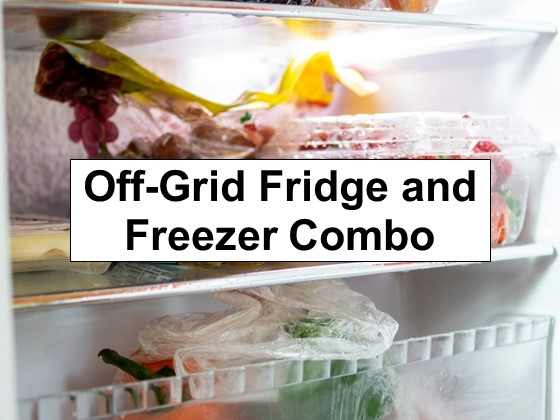I always enjoy seeing what other people come up with for solutions to off-grid refrigeration because, let’s face it, we’ve grown accustomed, if not reliance, on refrigeration. I mean, who wants to salt their fish or store cheese wheels in wax? I need my choose now, please!
For short term use, a 1500-watt power inverter, which is what I have, connected to your vehicle via a lengthy, high quality extension cord (you’ll probably need at least 50 feet, but measure to be sure) will suffice to keep things going; it’s what I do whenever I first lose power.
But there are times when you might need a longer-term solution, and that’s where off-grid power, such as a generator or solar panels come into play. And while we all have our preferences, what’s rarely discussed are the appliances used. They’re important choices because they’ll (1) keep your food cold or frozen and (2) use up that precious off-grid power. A poor choice could mean the difference between barely giving your cheese wheels a second thought or becoming a moldy mess in record time.
Now, I have my own beefs with traditional gas generators (they’re loud and less efficient than most vehicles) and solar generators (they’re expensive for what you get) but that doesn’t mean they’re the only solutions. If you don’t mind a little DIY, consider something like the setup in the video below. Granted, while he does utilize an Oupes power station, which he keeps fully charged, you can make your own setup with a little know-how. But that’s not what this post is about.
What I like most about the setup below is that he separates the cooling and freezing functions into two distinct units, which allows for more flexibility. For instance, let’s say there hasn’t been much sunshine in a few days, so your off-grid batteries are running low. Well, if you can leave the freezer turned off for 24 hours without sacrificing food safety, then you can focus on powering the mini fridge until the batteries can be recharged. If, however, you only had a single unit refrigerator and freezer combo, then you can’t make that choice. Moreover, as time goes on and your food gets used up, you might find need for refrigeration over freezing or vice-versa. Again, it’s about flexibility.
Of course, there is a cost involved, but you can work on a setup like this over time, adding batteries and appliances as you see fit. Overall, I like the idea and suggest that you work on something similar…

Leave a Reply